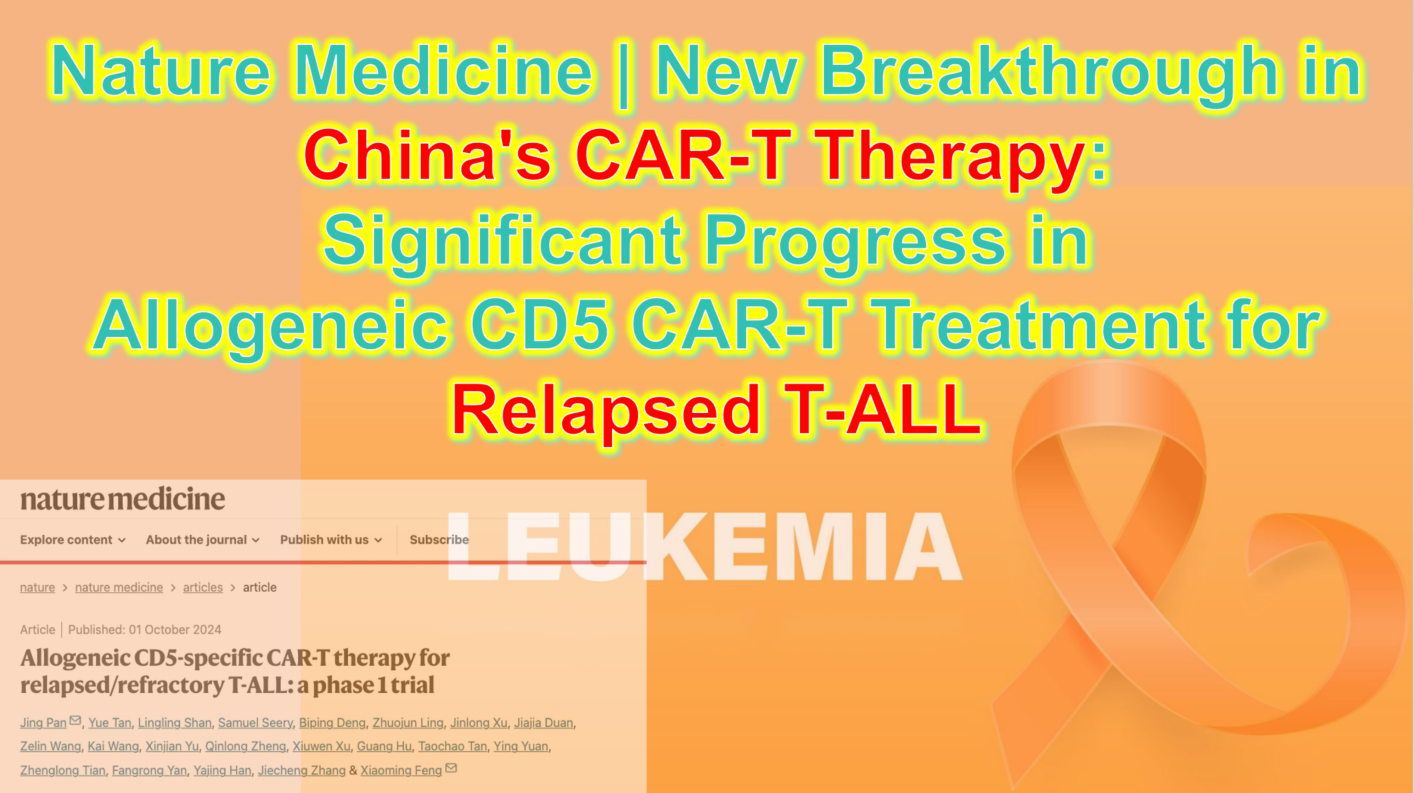Warning: Trying to access array offset on value of type bool in /www/wwwroot/www.medtourcn.com/wp-content/themes/medical-directory/framework/theme/medicaldirectory-image.php on line 78
Warning: Trying to access array offset on value of type bool in /www/wwwroot/www.medtourcn.com/wp-content/themes/medical-directory/framework/theme/medicaldirectory-image.php on line 79

Nature Medicine | New Breakthrough in China’s CAR-T Therapy: Significant Progress in Allogeneic CD5 CAR-T Treatment for Relapsed T-ALL
**Nature Medicine | New Breakthrough in China’s CAR-T Therapy: Significant Progress in Allogeneic CD5 CAR-T Treatment for Relapsed T-ALL**

T-ALL
#CAR-TTherapy #TALL #ALL #Leukemia #RelapsedLeukemia #TCellLeukemia #CD5 #CD7 #CART
Recently, a collaborative research study conducted by multiple Chinese medical and research institutions was published in *Nature Medicine*. This study, titled “Allogeneic CD5-specific CAR-T Therapy for Relapsed/Refractory T-ALL: A Phase 1 Trial,” demonstrated the potential of CD5 CAR-T cells in treating relapsed/refractory acute T-cell lymphoblastic leukemia (R/R T-ALL).
### Innovative Therapy Brings Hope
For a long time, patients with relapsed/refractory T-ALL have lacked effective treatment options and faced a poor prognosis. In recent years, CD7 CAR-T cell therapy has shown some efficacy in these patients, but CD7-negative relapse remains a significant challenge. This study focuses on evaluating the safety, efficacy, and pharmacokinetics of CD5 CAR-T cells, offering new insights for future treatments.
The study included 19 patients, most of whom had previously received CD7 CAR-T therapy. Results showed that this therapy was safe, with no dose-limiting toxicity observed, and adverse events were primarily manageable hematologic toxicity. In terms of efficacy, all patients achieved complete remission within 30 days of treatment. The study also demonstrated, for the first time, the persistence of CD5 CAR-T cells in the body and their ability to eliminate CD5+ T cells, indicating strong anti-tumor activity.
### Breakthrough in Treating Relapsed Patients
In addition to safety and efficacy, the research team explored the coexistence of CD7 CAR-T and CD5 CAR-T cells and studied immune cell changes in the patients. For those who relapsed after CD7 CAR-T treatment with CD7-negative cells, CD5 CAR-T offered a new salvage therapy, providing additional treatment options for such patients.
### Multidisciplinary Collaboration Drives Clinical Progress
Unlike CAR-T therapies for B-cell tumors, treating T-cell malignancies poses more challenges, particularly in controlling immune deficiencies. Dr. Jing Pan and her team conducted in-depth research on target selection and relapse mechanisms, while also focusing on balancing treatment safety and efficacy.
This study was made possible by the collaborative efforts of various medical institutions in China, collectively opening up a new therapeutic pathway for T-cell tumor patients.
### Looking Ahead
As innovations and advances in T-ALL treatment continue, the team plans to further research CD5 CAR-T therapy and collaborate with experts across various fields to optimize CAR-T treatment protocols, helping more patients with T-cell lymphoblastic tumors overcome their diseases.
This series of research achievements not only brings new hope to patients with R/R T-ALL but also provides valuable insights for the future development and optimization of CAR-T therapies. The team remains committed to a patient-centered approach, striving to drive continuous breakthroughs and innovations in T-cell tumor treatment.
To assess whether the condition is suitable for CAR-T therapy, you can submit pathology reports, treatment history, and discharge summaries to the Medical Department of <Advanced Medicine in China> for preliminary evaluation!
WhatsApp: +8613717959070
Https://wa.me/+8613717959070
Email: doctor.huang@globecancer.com
#Immunotherapy #CancerTreatment #TALLResearch #LeukemiaBreakthrough #Hematology #CellTherapy #CancerInnovation #CancerResearch #ClinicalTrials #MedicalBreakthrough
Warning: Trying to access array offset on value of type bool in /www/wwwroot/www.medtourcn.com/wp-content/themes/medical-directory/framework/theme/medicaldirectory-image.php on line 78
Warning: Trying to access array offset on value of type bool in /www/wwwroot/www.medtourcn.com/wp-content/themes/medical-directory/framework/theme/medicaldirectory-image.php on line 79

**2024 ASCO: National Institute’s New CAR-T Therapy CD7 CAR-T Cells, Multiple Blood Cancer Destroyers**
**2024 ASCO: National Institute’s New CAR-T Therapy CD7 CAR-T Cells, Multiple Blood Cancer Destroyers**

CAR-T Therapy
**2024 ASCO: Four Chinese-developed CAR-T therapies make a significant impact, targeting colorectal cancer, pancreatic cancer, and hematological tumors, with an overall response rate nearing 100.0%**
**CD7 CAR-T Cells: A Powerful Strike Against Hematological Tumors, Patients Achieve Complete Remission**
Patients with relapsed or refractory hematologic malignancies have limited treatment options and poor prognosis, with a 5-year overall survival rate of less than 20%. While allogeneic hematopoietic stem cell transplantation (HSCT) provides a critical strategy for treating aggressive hematologic cancers, HSCT treatment can also result in adverse reactions such as graft-versus-host disease (GVHD) and conditioning-related toxicities. Additionally, some patients with poor health cannot undergo this treatment. Therefore, new treatment methods are urgently needed, and the emergence of CAR-T therapy has brought new hope to patients with hematologic tumors.
The world-renowned journal, *The New England Journal of Medicine*, reported on a clinical study of “CD7 CAR-T cells for the treatment of relapsed or refractory CD7-positive hematologic tumors” (NCT04599556).
From November 2021 to September 2023, 10 patients with relapsed or refractory CD7-positive cancers were enrolled in the study, including 7 cases of acute myeloid leukemia (AML), 2 cases of T-cell acute lymphoblastic leukemia (ALL), and 1 case of T-cell lymphoblastic lymphoma (IVA stage). The median age was 56.5 years (range, 13.7–72.5 years). All patients had bone marrow involvement, with a median blast cell percentage of 36.0% (range, 2–87), and a median CD7 expression on blast cells of 93.0% (range, 80.7–97.7). All patients had received extensive prior treatments, with a median of 9.5 courses (range, 4–15 courses). After enrollment, patients first received an intensive lymphocyte-depleting regimen (cyclophosphamide, fludarabine, etoposide) and then CD7 CAR-T cell infusion therapy. After a median follow-up of 15.1 months, the results showed:
-
**Complete Remission (CR):** All patients (n=10) achieved complete remission (CR) after CAR-T cell therapy, though hematologic recovery was incomplete, with grade 4 pancytopenia. As of November 8, 2023 (data cutoff date), 6 patients had not received any further treatment and remained in minimal residual disease (MRD) negative complete remission.
-
**Overall Survival Rate:** The estimated 1-year overall survival rate was 68% [95% Confidence Interval (CI), 43–100].
-
**Disease-Free Survival Rate:** The estimated 1-year disease-free survival rate was 54% (95% CI, 29–100).
